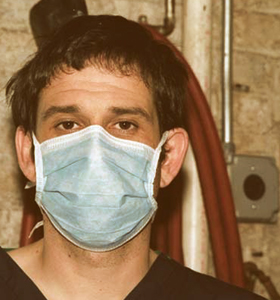Wednesday, January 21, 2026 |
||

CLINIC: What's Behind Those Surgical Masks? Taking the pulse of the cool British export Interview Yancey Strickler Photography Brendan Colthurst |
|

Hartley Ade Blackburn on why the group let their music be used in a Levi's ad: "We just thought, 'Everything is sponsored or has got outside money anyway.' " |
Strickler: "The Second Line" was in a blue-jeans commercial. Why did you do that?
Blackburn: We got asked to do it. It wasn't a case of us putting a song forward for the advert. At the time, some of the things that we weighed up as to whether to do or not would be things like the NME or Radio One in Britain. We just thought, "Everything is sponsored or has got outside money anyway." How much we actually got from it was 7,000 pounds. Someone I knew in Liverpool said, "Why haven't you retired? [laughs] What's going on?" Although you don't want to get into the "Well no, we only got this amount for it," that was what it was. Levi's policy is to try and get more unknown bands on the advert and don't pay them much money, but the exposure equals the money you didn't get. Turney: The exciting thing that I found about the song was that nobody actually knew who the band was that was doing the song on the advert. You get this weird difference where there's the advert, then there's the band that exists. Obviously the music is not going to burst out into the mainstream from prime-time television. You just have this weird situation where Clinic would be going along and then when it's on the television there's a little blip into the mainstream where people would wonder, "Who's this band?" Then we disappear again. I don't think it's made anybody more aware of the band. We just kept on, slightly on the up. It was just an unusual situation. Strickler: You were saying that all things have a corporate sponsorship, but you managed to tour with Radiohead when they kept corporations out. How did that relationship build with them? Blackburn: They heard some songs on the John Peel show, and just after that asked us if we wanted [to tour]. I was quite pleased that it wasn't through any record company or management group that we got it. To their credit, not just us, but they've had Sigur Rós and Beta Band as well. They could have had much bigger bands as supports, but they did it because they liked the music and it was compatible. It was definitely flattering to be asked by them to do it. Strickler: They've done their best to push you guys. Turney: Completely. It can't be negative press when a band that size, still maintaining credibility, can put forward Clinic as being one of their favorite bands. People are obviously interested to hear what they're listening to. There's going to be a lot of their fans that are going to like what Clinic are doing as well. It's a good thing. It's a bit different if we were touring with some mega-band where there is no compatibility at all and it's blatantly obvious that we are being pushed in on some kind of publicity stunt. Strickler: How does it compare playing to smaller audiences in the U.S.? Turney: Equally good. We just got back from Japan where there were half-full venues or a lot of people walking in certain nights, other nights packed out. [Then we played] Los Angeles on the first night to a packed-out venue. It's different, but it's equally exciting. Any gig where there is an atmosphere is more exciting. It's more difficult to fill a venue that houses 10,000 people than a venue that can house 300 people. Strickler: Do you play differently based on that size? Turney: We always try and inject a lot of energy into the set. It's essential that it has an energy to it and an edge to it, because otherwise it would just fall flat on itself. A lot of the momentum of the songs is trying to get the energy going. It can work on all levels as long as it's got that punchy sound right up front, and the energy. Blackburn: There's definitely a difference with doing Euro gigs where you know that the people are there because they know quite a lot of the songs in advance. It's a completely different atmosphere. In a lot of the Radiohead supports you're winning over the audience as the gig goes on. Which is a different kind of challenge. I probably prefer doing our own gigs. Turney: If you had to pick between the two, you can't spend your life being a support band. But there are little perks. Doing our own gigs, the priority is to play to the people who want to listen to us. |